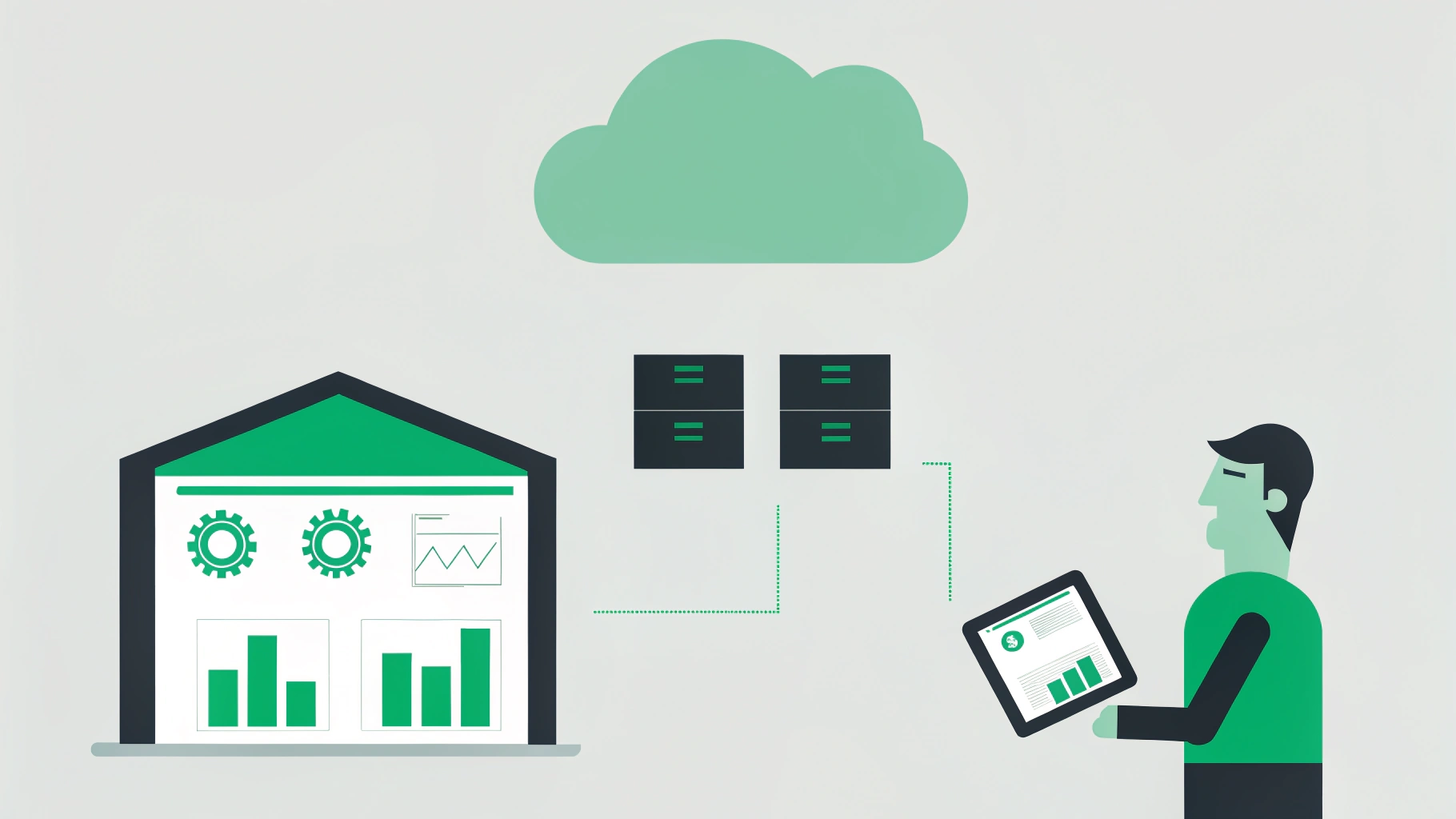Overview
The article examines a range of cloud business solutions designed to streamline distribution operations, emphasizing their distinctive features and benefits. Solutions such as 10X ERP, Salesforce, and NetSuite exemplify how cloud technology can significantly enhance efficiency, improve data management, and provide operational flexibility. This ultimately empowers businesses to adapt to the ever-evolving market demands. By leveraging these solutions, organizations can not only optimize their processes but also stay ahead of their competitors in a dynamic environment.
Introduction
The landscape of distribution operations is undergoing a rapid transformation, propelled by the widespread adoption of cloud technology. As businesses strive to enhance efficiency and streamline processes, cloud-based solutions have emerged as essential tools for achieving success. This article delves into ten innovative cloud business solutions that not only simplify distribution operations but also empower organizations to harness real-time data for informed decision-making. Yet, with a plethora of options available, how can companies discern which solutions will genuinely revolutionize their operations and provide a competitive advantage in an ever-evolving marketplace?
10X ERP: Cloud-Based ERP for Real-Time Data Management
10X ERP stands as a premier cloud-based ERP solution tailored specifically for wholesalers, boasting enhanced real-time data handling capabilities. With its , users can effortlessly access vital information from any web browser, empowering informed decision-making throughout the organization. The platform is equipped with robust accounting tools, dependable inventory control, and seamless app integrations, enabling distributors to optimize their operations efficiently, irrespective of their location. By leveraging the advantages of cloud technology, 10X ERP simplifies the complexities typically associated with traditional ERP systems, establishing itself as an indispensable asset for modern distribution operations.
As businesses increasingly gravitate towards cloud business solutions, a clear trend emerges: 70% of small and medium-sized businesses (SMBs) are poised to select a cloud-based ERP for their next application, underscoring a growing preference for scalable and flexible solutions. This shift is propelled by the demand for enhanced data accuracy, with companies that have adopted ERP systems reporting a remarkable 30-50% improvement in data accuracy following implementation. Looking ahead to 2025, the integration of AI and automation features is projected to be a priority for 80% of ERP users, further enhancing real-time data handling capabilities.
Real-world examples illustrate the effectiveness of cloud ERP in bolstering data handling within distribution. Firms utilizing 10X ERP have reported significant advancements in operational efficiency and productivity, with over 74% of these organizations experiencing improved processes post-implementation. This underscores the crucial role of real-time data handling in optimizing distribution operations and achieving strategic objectives.
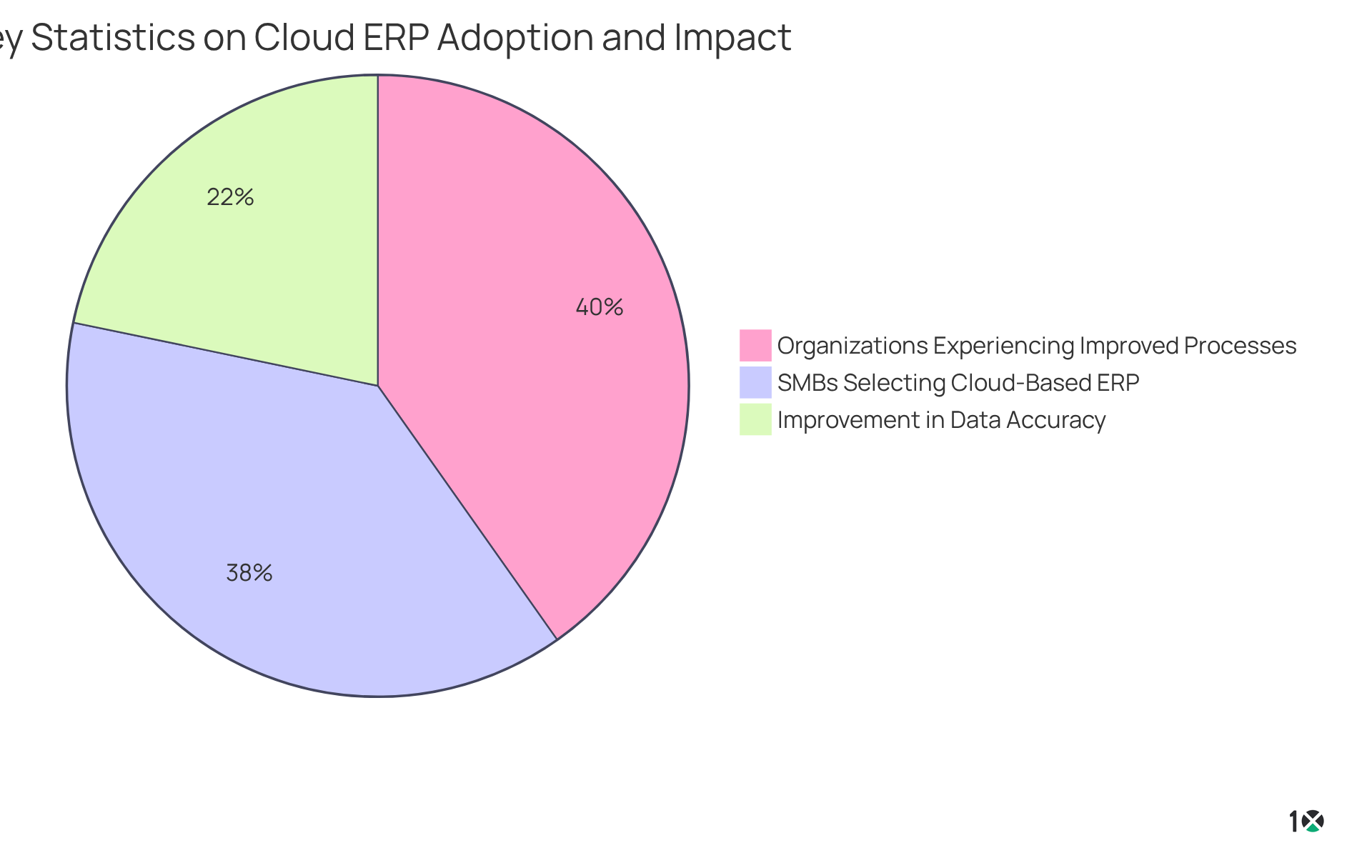
Salesforce: Comprehensive CRM for Enhanced Customer Management
Salesforce stands as a comprehensive (CRM) platform, empowering businesses to manage customer interactions and data with remarkable efficiency. Its robust features—ranging from sales forecasting to lead management and customer service automation—significantly enhance customer engagement and retention.
For suppliers, integrating Salesforce with their ERP system is not just beneficial; it streamlines processes, enhances communication, and provides invaluable insights into customer behavior, ultimately driving sales and fostering growth.
Industry insights reveal that 71% of businesses aim to leverage ERP data for operational efficiency, underscoring Salesforce’s pivotal role in facilitating this integration. As organizations face increasing challenges without CRM integration, the synergy between Salesforce and ERP systems emerges as essential for businesses aspiring to thrive in 2025 and beyond.
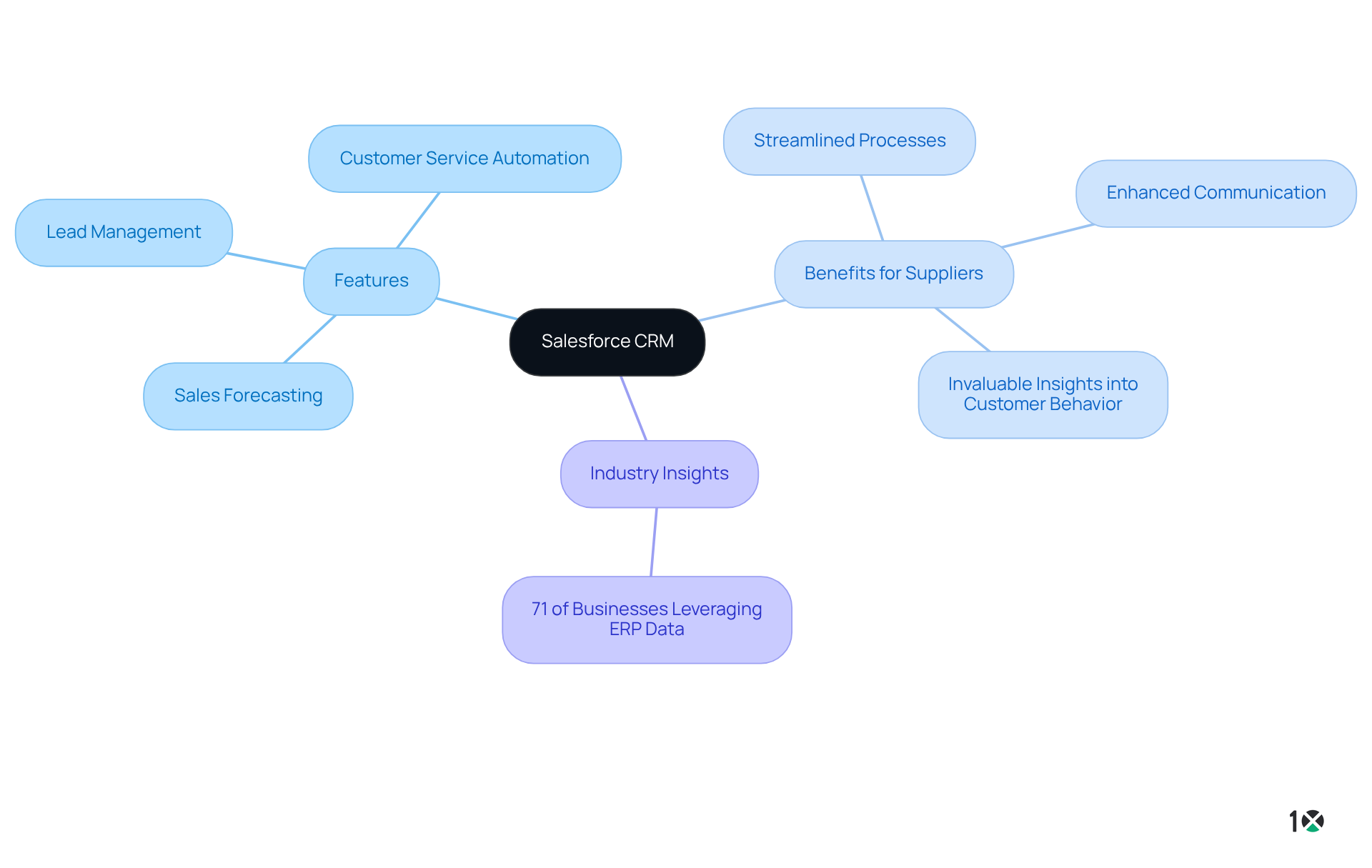
NetSuite: Integrated Cloud ERP for Financial and Inventory Management
NetSuite distinguishes itself as a powerful integrated cloud ERP solution, offering extensive financial and inventory oversight features tailored for wholesalers. By automating financial processes, it empowers enterprises to streamline operations and enhance accuracy. Real-time inventory oversight stands out as a crucial aspect, enabling suppliers to dynamically track stock levels and make informed decisions based on current data. Advanced reporting tools deliver valuable insights into operational performance, facilitating strategic planning and compliance.
As we look ahead to 2025, trends indicate a significant shift towards integrated cloud business solutions, with projections suggesting that over 11,844 companies will adopt NetSuite ERP. This reflects a growing preference for flexibility and efficiency in business operations. Notably, 85% of organizations that consult software experts for ERP implementation report successful outcomes, underscoring the importance of expert guidance in navigating these transitions. Moreover, companies that implement financial automation within their distribution processes can anticipate a 10-30% reduction in operational costs, while ERP systems can enhance productivity by up to 20%. These statistics underscore the tangible benefits of adopting advanced ERP solutions like NetSuite.
As David Luther, a digital content strategist, aptly states, “An enterprise resource planning (ERP) system is the key to integrating different business functions across an organization.” This positions NetSuite as an ideal choice for expanding suppliers seeking to enhance their .
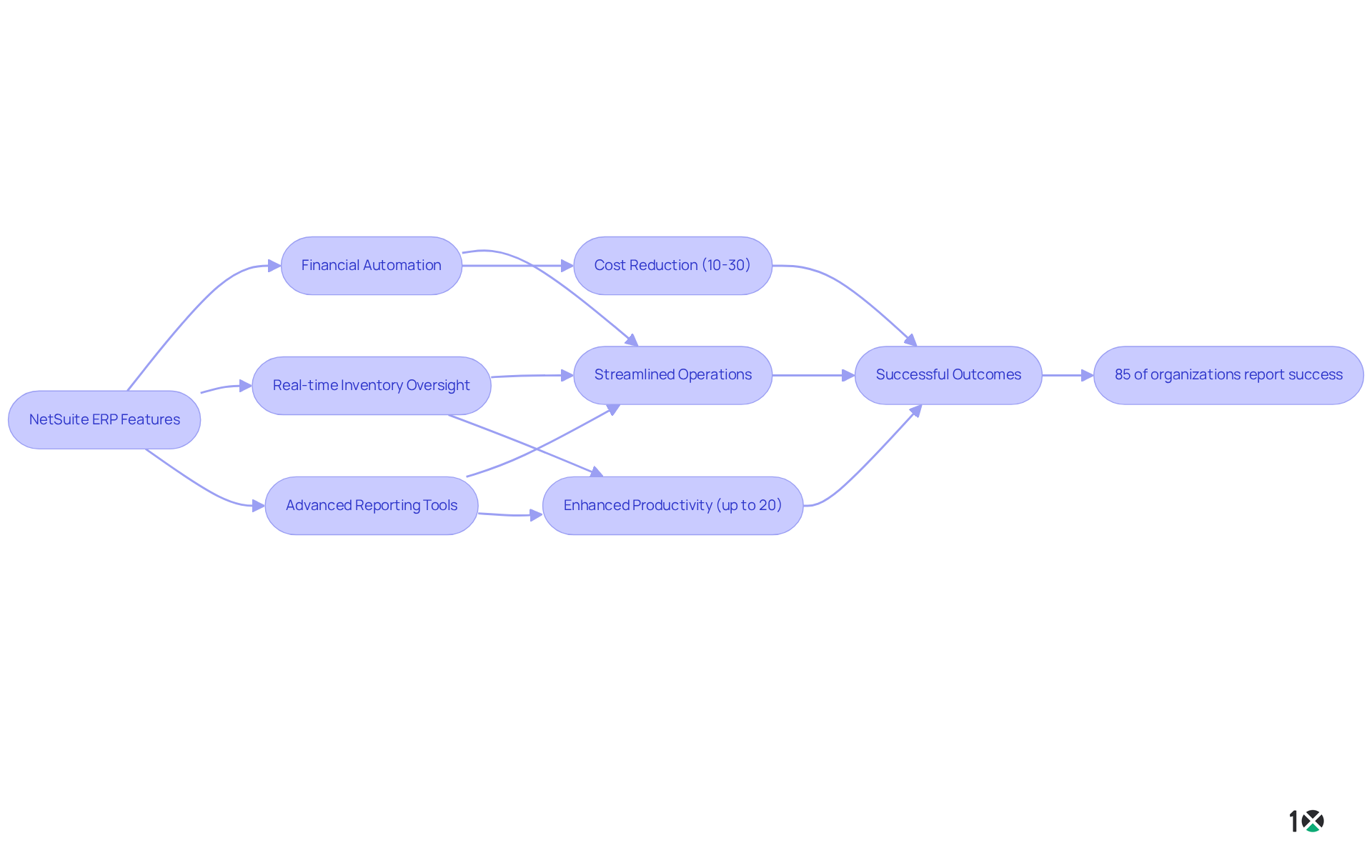
Microsoft Azure: Scalable Cloud Services for Application Management
Microsoft Azure emerges as a formidable platform for managing cloud applications, particularly for suppliers in search of scalable solutions. Its services empower organizations to deploy, manage, and monitor applications with exceptional ease. Distributors reap the benefits of Azure’s capacity to dynamically adjust resources, enabling them to scale operations in response to fluctuating market demands. This flexibility is essential in a fast-paced environment where responsiveness can significantly influence competitiveness.
Furthermore, Azure’s robust security features protect sensitive data, ensuring compliance with various standards such as HIPAA and FedRAMP, thereby enhancing operational trustworthiness. With over 486,738 companies utilizing Azure for their daily services, including 85% of Fortune 500 firms, the is well-documented. Real-world examples illustrate how suppliers successfully leverage Azure to enhance their operational capabilities, showcasing the tangible benefits of cloud scalability. Additionally, Azure’s Hybrid Benefit allows organizations to save up to 80% when paired with Reserved Instances, positioning it as a cost-effective choice. As companies increasingly transition to cloud solutions, Azure’s extensive offerings establish it as a preferred option for suppliers aiming to simplify operations and boost overall efficiency.
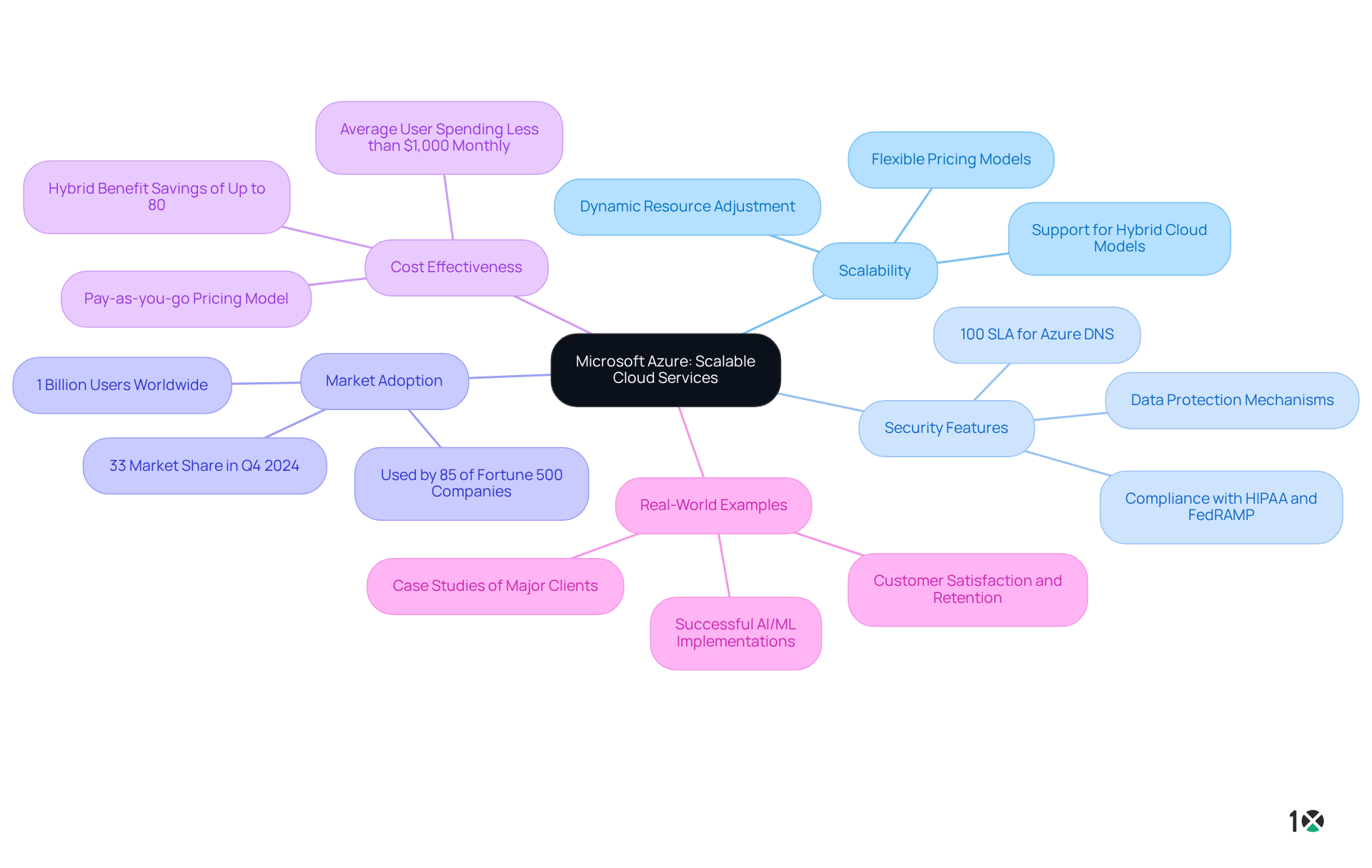
Amazon Web Services: Versatile Cloud Solutions for Data Management
Amazon Web Services (AWS) provides a comprehensive suite of cloud business solutions designed for efficient data management. Services such as Amazon S3 for scalable storage, Amazon RDS for robust database management, and AWS Lambda for serverless computing empower distributors to manage their data with heightened efficiency and security. The adaptability of AWS allows organizations to quickly respond to evolving data needs, which is crucial for maintaining operational efficiency and fostering growth.
In 2023, a remarkable 94% of major companies worldwide embraced cloud computing, underscoring its vital role in contemporary business practices. Distributors leveraging AWS have reported significant improvements in data handling efficiency, with many achieving up to a 30% reduction in operational costs. For example, Zomato’s transition to AWS Graviton2 instances led to a 25% performance enhancement, illustrating how cloud business solutions can directly bolster operational capabilities.
Looking ahead to 2025, trends suggest that the demand for cloud-based data management solutions will continue to escalate, with 97% of IT leaders intending to expand their cloud infrastructures. This shift highlights the necessity of adopting to optimize distribution operations and gain a competitive edge in an increasingly digital marketplace.
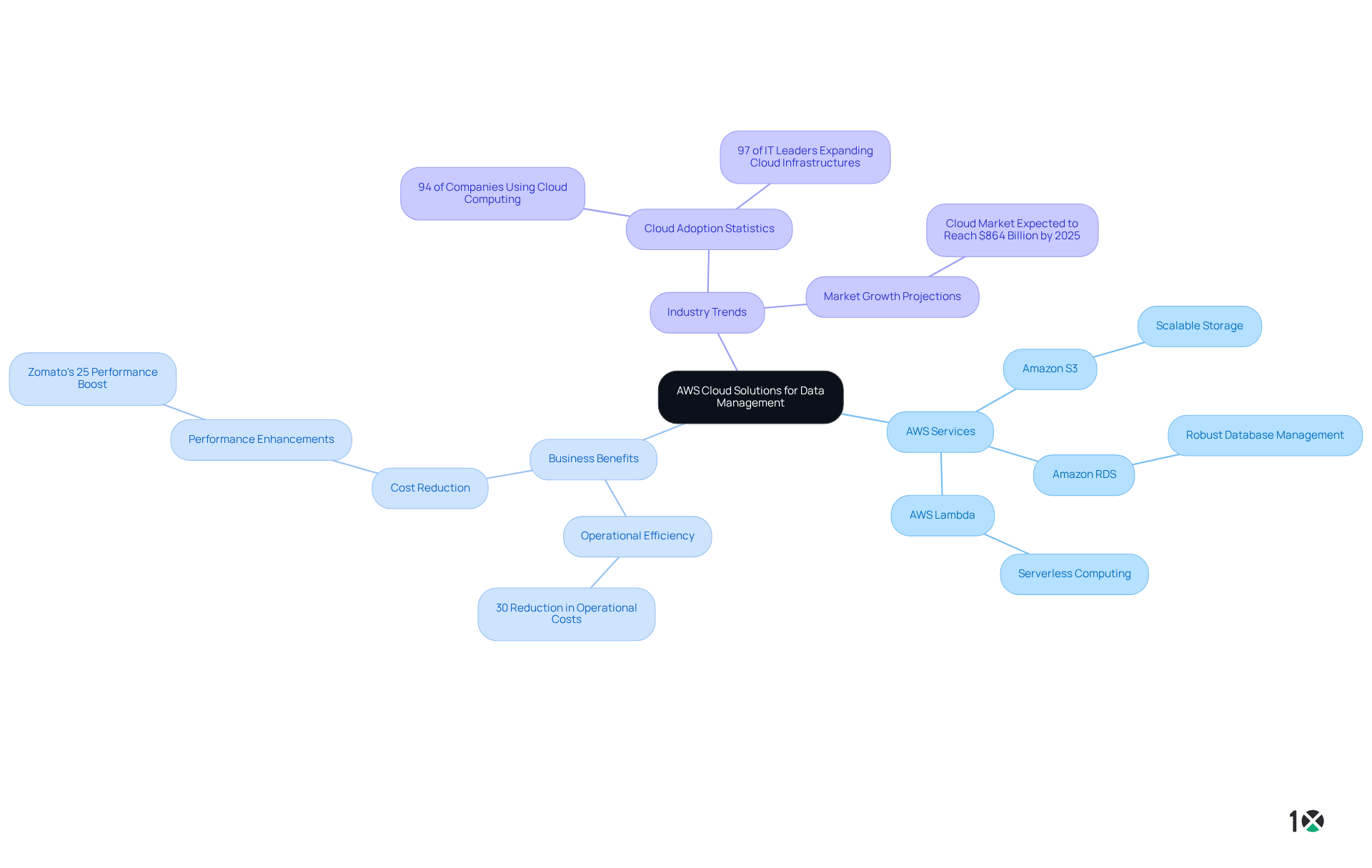
IBM Cloud: AI-Driven Insights for Operational Efficiency
IBM Cloud harnesses the power of artificial intelligence to deliver actionable insights that significantly enhance operational efficiency for suppliers. By integrating AI capabilities into its cloud services, IBM empowers businesses to automate processes, perform real-time data analysis, and make informed decisions. This integration not only enhances productivity but also enables organizations to pinpoint . For example, a leading logistics provider leveraging IBM Cloud achieved nearly a 10% increase in warehouse capacity without acquiring additional real estate, highlighting the tangible advantages of AI in operational workflows.
Experts in the field, including Glyn Roberts, assert that AI-driven insights can lead to a remarkable 44% boost in productivity. This underscores the potential of IBM’s cloud business solutions as an indispensable tool for modern distribution operations. As AI continues to evolve, with projections indicating substantial growth in the AI market, its role in streamlining distribution processes will become increasingly vital, positioning IBM as a key player in providing cloud business solutions within the industry.
However, organizations must navigate challenges such as limited skills and high costs to fully harness AI’s capabilities. Addressing these obstacles will be crucial for maximizing the benefits of AI integration in operational strategies.
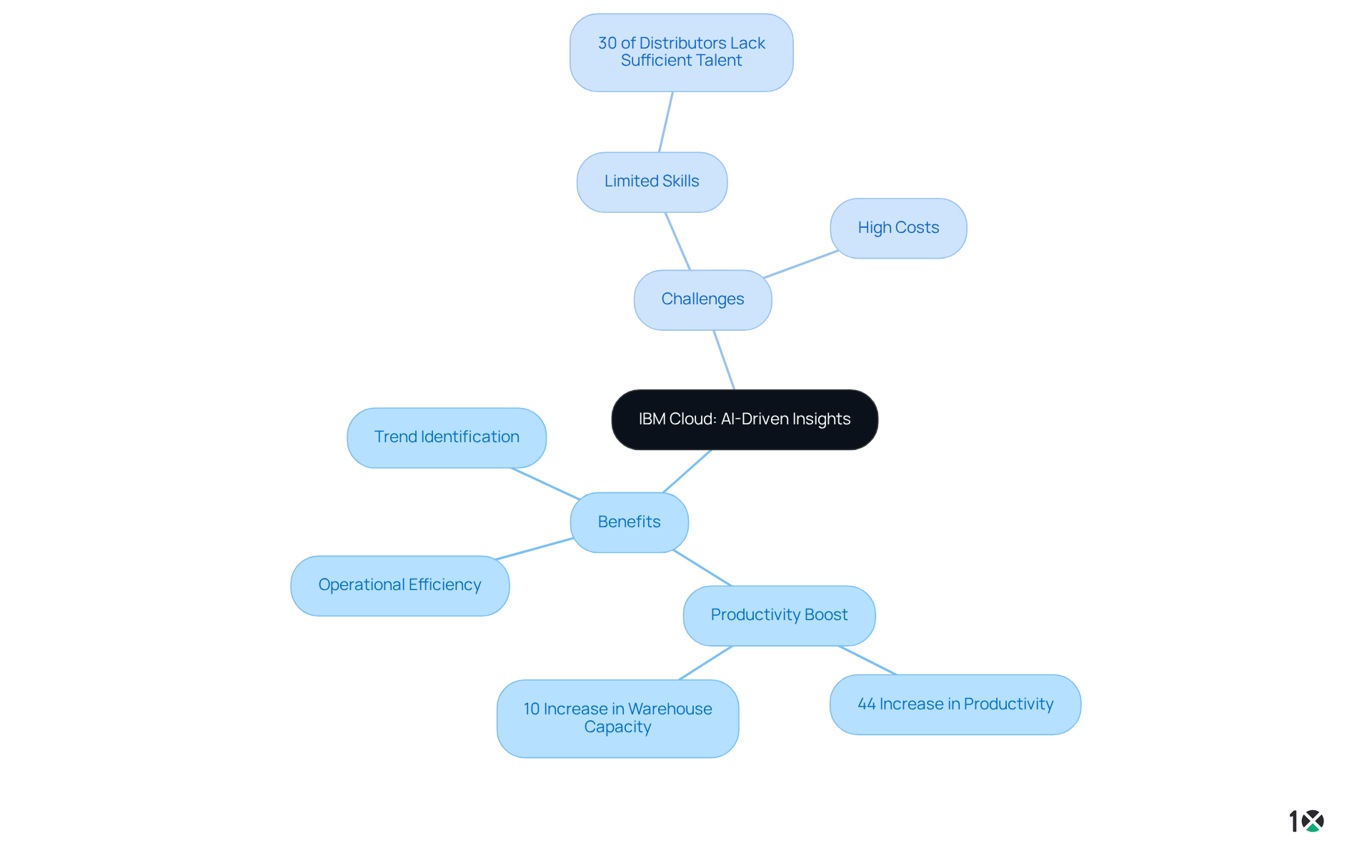
SAP Business ByDesign: Cloud ERP for Mid-Sized Distributors
SAP Business ByDesign stands out as a cloud ERP solution meticulously crafted for mid-sized distributors, leveraging service-oriented architecture (SOA) and built on the robust SAP NetWeaver technology stack. This platform provides a comprehensive suite of features, encompassing financial management, supply chain management, and customer relationship management. Organizations can harness real-time insights and automation capabilities, significantly streamlining operations and enhancing visibility across all functions.
By facilitating informed decision-making, SAP Business ByDesign emerges as an indispensable tool for businesses aiming to scale efficiently. With a , the platform has consistently demonstrated its reliability and effectiveness in the market. As we approach 2025, the trend towards cloud business solutions, particularly cloud ERP solutions, is on the rise, with 51% of SAP Business ByDesign customers being medium-sized companies increasingly adopting these technologies to boost operational efficiency and responsiveness.
Real-world examples illustrate that organizations leveraging SAP Business ByDesign experience notable operational enhancements, such as reduced time to market and improved supply-demand alignment, ultimately leading to heightened customer satisfaction and growth. Furthermore, the platform champions digital transformation for SMBs by offering flexibility, intelligence, and openness, coupled with a transparent pricing structure and a money-back guarantee. This makes it a compelling choice for potential users seeking to elevate their operations.
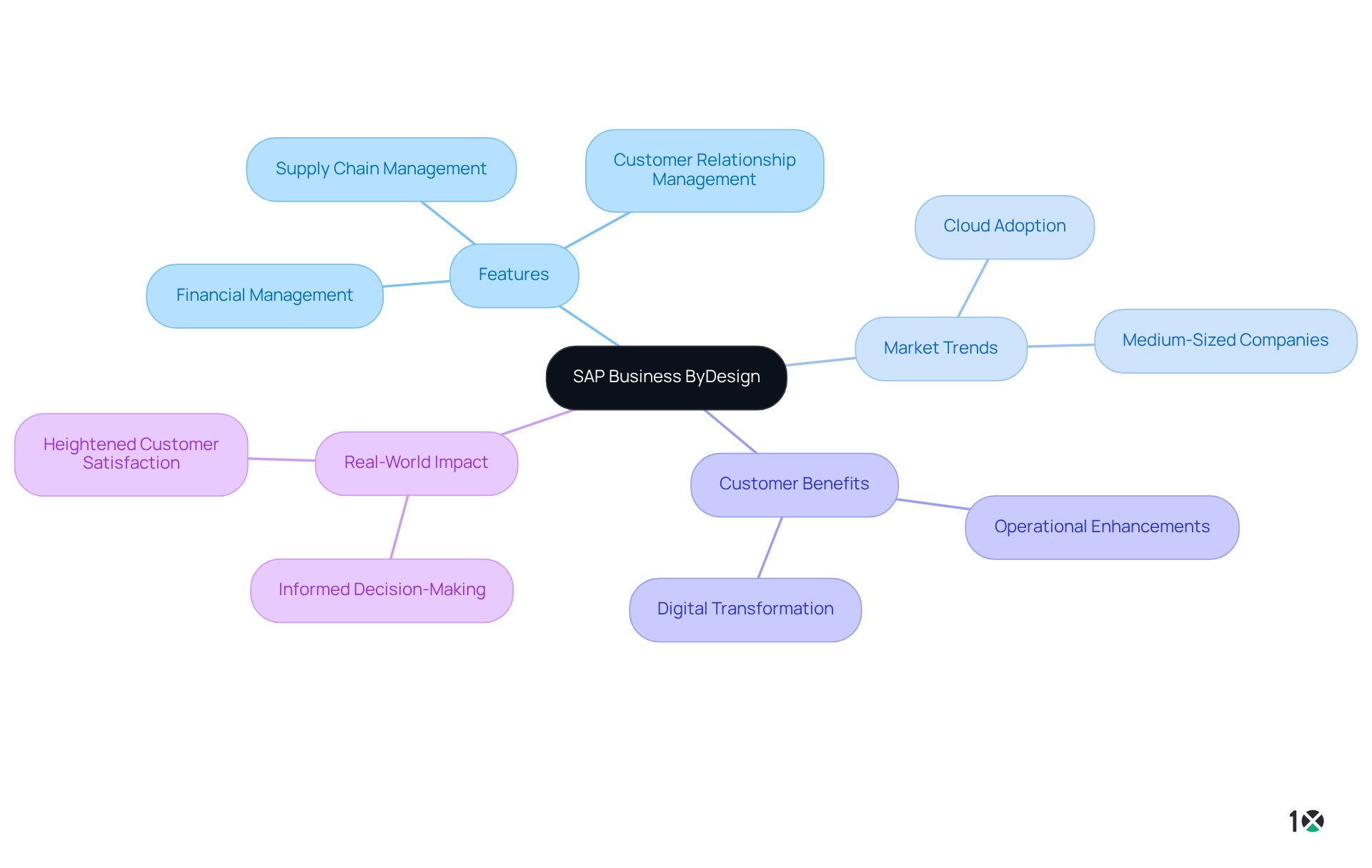
Oracle Cloud: Integrated Applications for Supply Chain Management
Oracle Cloud presents a comprehensive suite of interconnected applications designed to significantly enhance supply chain operations for suppliers. Its robust features—such as advanced inventory management, order processing, and demand forecasting—empower companies to streamline their operations effectively. By leveraging real-time data and analytics, Oracle Cloud equips distributors to make informed decisions that drive cost reductions and elevate customer satisfaction. Notably, companies utilizing Oracle Cloud have reported substantial improvements in inventory accuracy and order fulfillment rates, which are essential for sustaining a competitive edge in today’s fast-paced market.
Looking ahead to 2025, trends indicate an increasing reliance on integrated applications, with over 50% of supply chain organizations expected to have technology leaders reporting directly to the Chief Supply Chain Officer. This shift underscores the critical need for to optimize distribution operations and enhance overall efficiency. Embracing these innovations is not merely an option; it is a strategic imperative for organizations aiming to thrive in the evolving landscape of supply chain management.
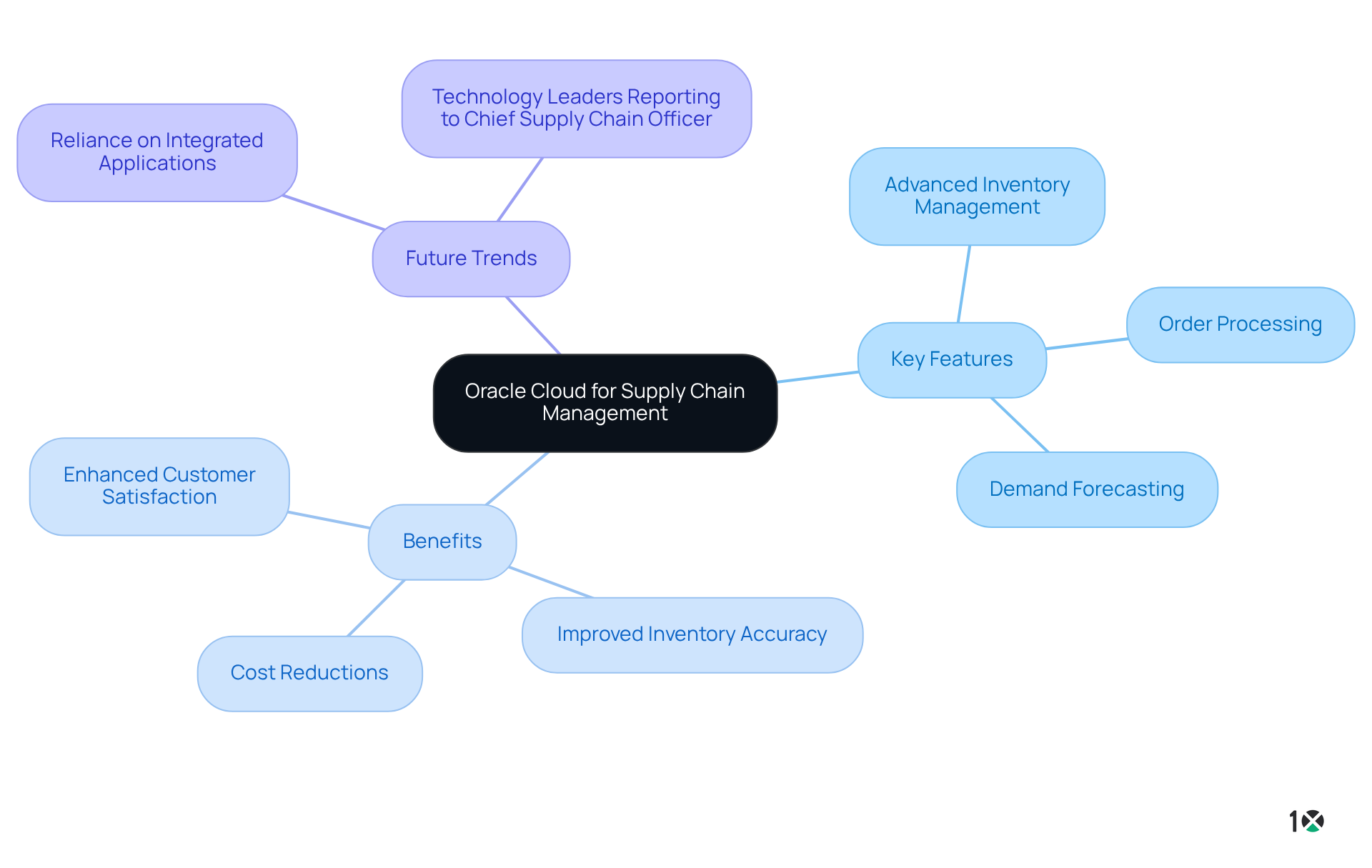
Zoho One: All-in-One Cloud Applications for Business Management
Zoho One stands as a comprehensive suite of cloud applications meticulously designed to streamline various operational aspects. With an impressive array of over 45 integrated applications, it encompasses everything from CRM and project management to accounting and HR. For suppliers, this all-encompassing solution not only streamlines operations but also enhances collaboration and provides a cohesive perspective on business performance, ultimately promoting growth and increasing efficiency. In contrast, 10X ERP offers robust features tailored specifically for suppliers, emphasizing real-time data processing and seamless integration.
Statistics indicate that organizations adopting all-in-one cloud applications witness substantial operational improvements. For example, a retail solutions provider reported an astounding 660 percent return on investment following the implementation of Zoho One, underscoring the platform’s potential to drive efficiency and profitability for distributors. Furthermore, 55% of Zoho CRM users acknowledged a direct impact on their revenues attributed to the platform’s AI features, illustrating the effectiveness of integrated solutions in enhancing operational outcomes.
Insights from industry leaders further emphasize the transformative impact of Zoho One on business management. Timothy Kasbe remarked, “The breadth of apps within Zoho One has allowed our more than 12,000 employees to work more seamlessly as one team,” highlighting the platform’s capability to unify disparate functions and foster collaboration. Practical instances also reveal enhancements in operational efficiency; organizations have observed a 20 percent increase in new client onboarding efficiency post-implementation of Zoho One, showcasing its ability to optimize processes for suppliers.
As we approach 2025, the demand for all-in-one cloud applications among suppliers continues to rise. These solutions not only simplify complex operations but also empower organizations to , ultimately enhancing their competitive advantage in the market.
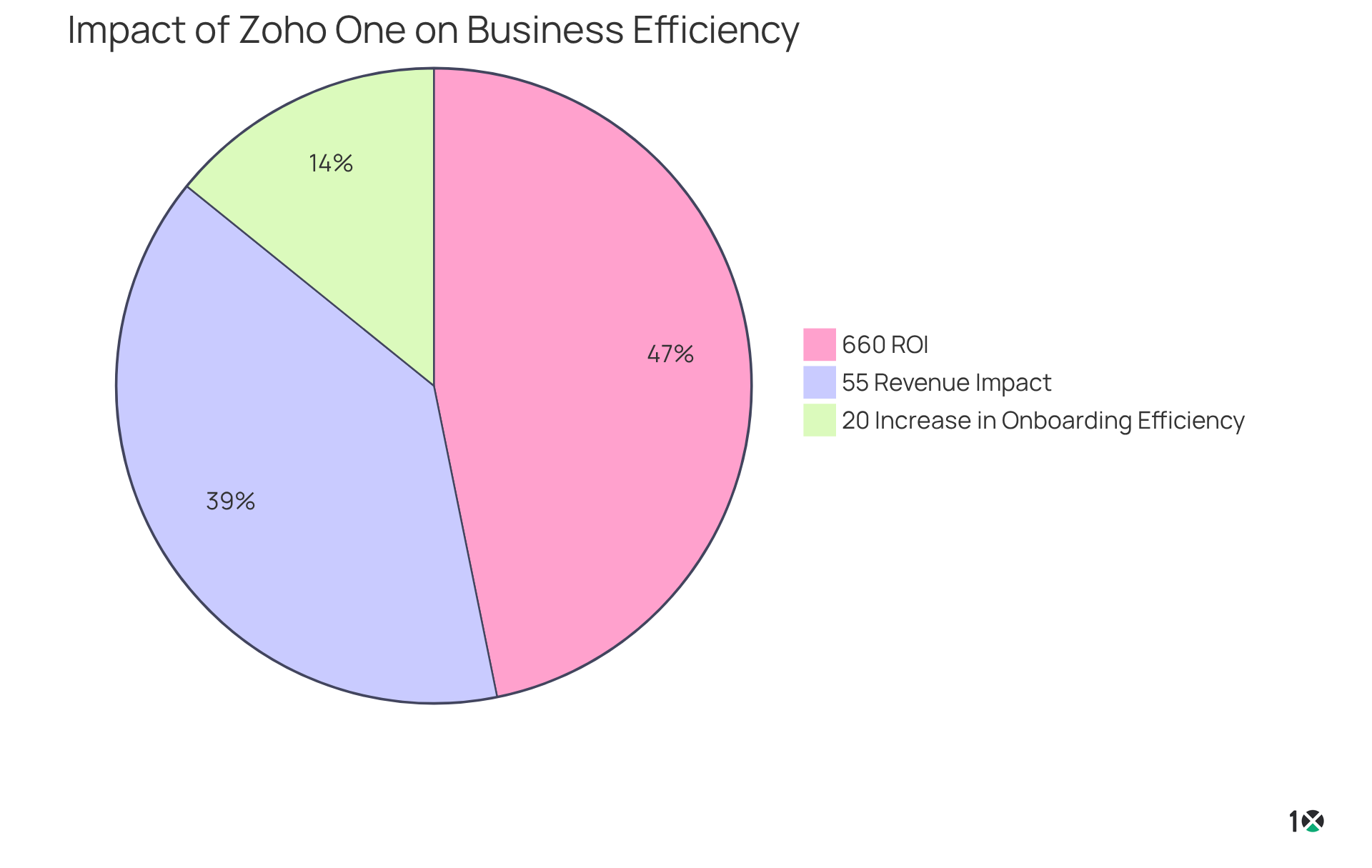
Mitel: Cloud Communication Solutions for Enhanced Team Collaboration
Mitel offers cloud business solutions designed to significantly enhance team collaboration and productivity. By integrating voice, video, and messaging, Mitel’s solutions facilitate seamless communication among team members, regardless of their location. For distributors, effective communication is not just beneficial; it is essential for coordinating operations, managing customer relationships, and driving sales. Mitel’s tools empower businesses to foster collaboration, streamline workflows, and ultimately improve overall efficiency.
Consider the impact of effective communication on your operations. With Mitel’s cloud business solutions, you can and collaborate, which leads to increased productivity and a stronger competitive edge in the market. Don’t miss the opportunity to elevate your business operations—explore Mitel’s solutions today.
Conclusion
The exploration of cloud business solutions reveals a transformative shift in the management of distribution operations. By leveraging advanced technologies such as cloud-based ERP systems, CRMs, and integrated applications, companies can significantly enhance efficiency, improve data accuracy, and streamline their processes. This evolution empowers organizations to make informed decisions and positions them to thrive in a competitive landscape.
Throughout the article, key solutions like 10X ERP, Salesforce, NetSuite, and others have been highlighted for their unique capabilities in addressing the specific needs of distributors. From real-time data management to comprehensive customer relationship management, these tools facilitate substantial operational improvements. The statistics presented illustrate the tangible benefits of adopting these cloud solutions, including increased productivity, reduced operational costs, and enhanced customer satisfaction.
As the demand for cloud technologies continues to grow, it is imperative for businesses to embrace these innovations. The future of distribution operations hinges on the ability to integrate advanced cloud solutions that simplify workflows and foster collaboration and agility. Organizations are encouraged to evaluate their current processes and consider the adoption of these powerful tools to maintain a competitive edge and drive sustainable growth in the evolving digital marketplace.
Frequently Asked Questions
What is 10X ERP and what are its main features?
10X ERP is a cloud-based ERP solution designed for wholesalers, featuring real-time data management, robust accounting tools, dependable inventory control, and seamless app integrations. It allows users to access vital information from any web browser, facilitating informed decision-making.
What advantages does 10X ERP offer over traditional ERP systems?
10X ERP simplifies the complexities of traditional ERP systems by leveraging cloud technology, making it easier for users to manage operations efficiently from any location.
What trends are emerging regarding cloud-based ERP adoption among small and medium-sized businesses?
A significant trend shows that 70% of small and medium-sized businesses (SMBs) plan to choose a cloud-based ERP for their next application, driven by the need for scalable and flexible solutions.
How does implementing an ERP system impact data accuracy?
Companies that have adopted ERP systems report a 30-50% improvement in data accuracy following implementation.
What is the projected future for ERP users regarding AI and automation?
By 2025, 80% of ERP users are expected to prioritize the integration of AI and automation features to enhance real-time data handling capabilities.
What benefits have organizations experienced after implementing 10X ERP?
Over 74% of organizations using 10X ERP have reported improvements in operational efficiency and productivity, highlighting the importance of real-time data handling in optimizing distribution operations.
What is Salesforce and how does it benefit businesses?
Salesforce is a comprehensive customer relationship management (CRM) platform that helps businesses manage customer interactions and data efficiently, enhancing customer engagement and retention.
Why is integrating Salesforce with ERP systems important for suppliers?
Integrating Salesforce with ERP systems streamlines processes, enhances communication, and provides valuable insights into customer behavior, ultimately driving sales and growth.
What percentage of businesses aim to leverage ERP data for operational efficiency?
71% of businesses aim to leverage ERP data to improve their operational efficiency.
What distinguishes NetSuite as an ERP solution?
NetSuite is an integrated cloud ERP solution that offers extensive financial and inventory management features, automating financial processes and providing real-time inventory oversight.
What are the expected trends for integrated cloud business solutions by 2025?
It is projected that over 11,844 companies will adopt NetSuite ERP, reflecting a growing preference for flexibility and efficiency in business operations.
How does expert guidance impact ERP implementation success?
85% of organizations that consult software experts for ERP implementation report successful outcomes, emphasizing the importance of expert guidance in the transition process.
What operational cost reductions can companies expect from financial automation in distribution processes?
Companies implementing financial automation may anticipate a 10-30% reduction in operational costs.
How do ERP systems affect productivity?
ERP systems can enhance productivity by up to 20%, providing tangible benefits to organizations.
